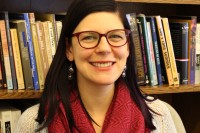On entering middle age
The first time it struck me, I was reading Henri Nouwen’s Our Greatest Gift: A Meditation on Dying and Caring. “It seems fair to say that between the ages of one and thirty, people are considered young; between thirty and sixty, they are considered middle aged,” Nouwen writes. I was 29 and a little terrified.
The second time, my congregation was singing Marty Haugen’s “Gather Us In” on a Sunday morning, and I started thinking as we began the second verse:
We are the young, our lives are a mystery;
We are the old who yearn for your face.
I’m pretty sure my life is not of the sort that inspired Haugen’s poetry. It’s in the middle of the two.
I’ve decided that Nouwen’s right. The average life span in the U.S. is 79 (81 in Canada and 87 in England). It seems that we’re accustomed to thinking of 40 or so as when a person becomes middle aged. But that’s the beginning of the second half of life, not the middle.
Yes, there are lots of different ways to divide up times of life, and hey, if my fellow 30-somethings don’t want to be middle aged yet, I don’t need to convince them. (Likewise if people in their 60s aren’t ready to stop being middle aged.) But I’ve learned that there are spiritual benefits in surrendering to the turning of life's seasons.
As I began to live into this idea, one among many I’ve gleaned from Nouwen’s writing to promote my spiritual growth, my body decided to test how deep that acceptance went. Hip pain worsened from an old muscle strain. Sleep became difficult, and I went to an orthopedic doctor. While the immediate diagnosis for my pain was something that should go away with time, after ten weeks of physical therapy it became clear that I should keep doing the stretches I learned there daily to address my “biomechanical problems,” as the doctor called them.
My initial reaction, recalling when I was diagnosed with an unrelated chronic illness at age 26, was to feel demoralized and even a little indignant. Why do I have to deal with so much when many of my peers don’t? Why do I keep getting diagnosed with conditions that usually don’t show up until later decades?
When I think of myself as young, I get petulant—oh the unfairness of it all! When I see myself as entering middle age, I can take off my paper hat, put away my noisemaker, and stop throwing myself a pity party. This is my body in the middle third of my life, and I can find ways to live faithfully with and in it.
This new challenge in accepting—loving—one’s body as it ages was what most stayed with me from a Century article by Janice Jean Springer on how she came to view her Parkinson’s disease not as impeding spiritual practice but as inviting a different way of engaging in those disciplines:
I practice forgiving my body for getting sick and growing old, and forgiving myself for my times of discouragement or despair. I try to practice compassion toward each part of my body that isn’t working quite right, compassion toward myself for not being perfect.
Her words resonated with me as I was grasping for a way to cope with my daily health regimen and—as Springer notes ironically in the medical advice she also receives—to avoid being stressed about it all. Following Springer’s example, I’m trying to transform that regimen—a set of rules I have to follow to stay as healthy as possible—into more of an examen, a series of opportunities to grow in awareness of God's presence and my own gratitude each day.
The urgency of a doctor's advice fades with time, and new year's resolutions often fall by the wayside come February. But longing for connection with God, and building that relationship through practices that are both physical and spiritual—that is new every morning.
If I continue to follow these daily disciplines, though I may no longer have all of the health and energy of youth, I may find some of the wisdom of (middle) age.





